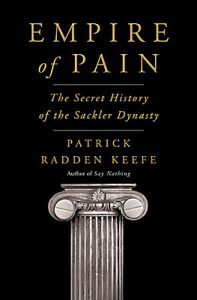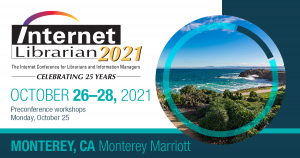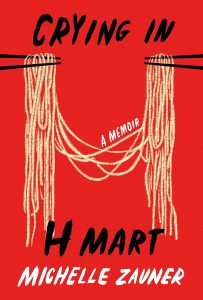Search the Blog
Categories
- Books & Reading
- Broadband Buzz
- Census
- Education & Training
- General
- Grants
- Information Resources
- Library Management
- Nebraska Center for the Book
- Nebraska Memories
- Now hiring @ your library
- Preservation
- Pretty Sweet Tech
- Programming
- Public Library Boards of Trustees
- Public Relations
- Talking Book & Braille Service (TBBS)
- Technology
- Uncategorized
- What's Up Doc / Govdocs
- Youth Services
Archives
Subscribe
Author Archives: Susan Knisely
NewsBank Trial Access Through May 14, 2022
NewsBank is a web-based subscription service that offers library access to current and archival content from newspapers, newswires, transcripts, and other publications. They have agreed to offer Nebraska libraries trial access to the following resources through May 14, 2022:
- Access World News (covers 1980-present; contains over 13K global sources, including Lincoln Journal Star and Omaha World Herald)
- America’s Historical Newspapers & Timeline (covers 1690-2000, includes 448 U.S. Newspapers)
- Black Life in America
- Hispanic Life in America
- ResearchRocket (Primary)
Trial access instructions, including product login URLs and a temporary username and password, were distributed via an April 12, 2022 message to the TRIAL mailing list. Nebraska librarians who didn’t receive this information or who would like to have it sent to them again can email Susan Knisely.
Note: If you are a Nebraska librarian and you’d like to receive future database trial announcements directly in your email inbox, please make sure you are signed up for the Nebraska Library Commission’s TRIAL mailing list.
Posted in Technology
Leave a comment
Computers in Libraries 2022 Conference (March 29–March 31) Going Virtual
The Computers in Libraries Conference, originally scheduled for March 29th through March 31st at the Hyatt Regency Crystal City, in Arlington, VA, is switching to a virtual format. See their online announcement for more information.
The virtual event is scheduled for the same week that had been set aside for the in-person conference, and a Virtual Pass for March 29-31 will provide you with access to all keynotes and main conference sessions, networking, and the virtual exhibit hall. It also includes access to archived session recordings for viewing through June 30, 2022. (Note: This pass does not provide access to workshops.) See the Computers in Libraries Connect 2022 website for more details.
Nebraska librarians are still eligible for a discount if they sign up for a Virtual Pass to this conference using the Nebraska Library Commission discount code: NLC22. The discounted rate for a Virtual Pass is $199. This is a $100 savings off the regular $299 price.
To receive a Virtual Pass discount:
- Go to the Register page and click “Attendee.”
- Complete the form and click “Proceed to Tickets.”
- Add 1 Virtual Pass ticket and scroll to the bottom of the form.
- Type NLC22 in the Promotion Code field and click “Apply.”
- You should see a pop-up telling you the code has been successfully applied. At this point you can enter your payment information and click “Checkout.”
Note: During the Early Bird registration period all registrants will receive the $199 rate, so during this time entering the code NLC22 will just be for tracking purposes. On February 25th (at midnight ET) the Early Bird pricing will end and the regular rate will change to $299. At that time, the NLC22 group code will adjust the rate to $199 when users register and apply it.
If you have questions, please contact Susan Knisely
Posted in Education & Training, Technology
Leave a comment
Friday Reads: Empire of Pain: The Secret History of the Sackler Dynasty, by Patrick Radden Keefe
Patrick Radden Keefe’s latest book, Empire of Pain, released on April 12, 2021, is a timely account of three generations of the Sackler family and the role they’ve played in the ongoing opioid crisis. It starts out as a classic American rags-to-riches story–three entrepreneurial brothers, born to poor immigrant parents in Brooklyn in the early 20th century, who succeed beyond their wildest dreams, winding up as billionaire philanthropists. It also tells a darker tale of corporate greed, coupled with personal hubris, leading to devastating social consequences.
Most of us know a bit about the Sacklers, due to media coverage of the multiple lawsuits filed against their privately owned company, Purdue Pharma, which manufactures and markets OxyContin. Purdue Pharma introduced this highly addictive extended-release painkiller to the market in 1996, and it was a game changer. Indeed, many view its arrival on the scene as the most significant precipitating event leading to the now-decades-long opioid epidemic.
If you want to know more, Keefe’s extensively researched book provides compelling evidence of why this family and their pharmaceutical company are viewed as culpable. And sadly, it feels like a too-familiar narrative:
- There’s the FDA employee who, shortly after overseeing approval of OxyContin, wound up accepting a well-paid position with Purdue Pharma.
- There’s the misleading marketing strategy of touting OxyContin as less addictive and less prone to abuse because of its time-release coating, even though company insiders knew from monitoring online discussion groups that users were crushing and chewing the drug to get a bigger “hit.”
- There’s the sales force that continued to call on and sell to doctors who were clearly running pill mills, because of unending pressure to increase revenue.
- And finally, there is the pathological refusal of family members to accept any responsibility for the problems that proliferated in conjunction with OxyContin sales. They seemed to view reports of OxyContin-related addiction and overdose deaths as PR problems that unfairly sullied the reputation of Purdue’s prized product, not as human tragedies: Addicts were the victimizers and Purdue Pharma and the Sacklers were the victims.
If you’re a fan of corporate exposes, this book will be right down your alley. It would also be a good companion read if you are watching the limited series Dopesick, now streaming on Hulu.
Keefe, Patrick Radden. Empire of Pain: The Secret History of the Sackler Dynasty. New York: Doubleday, 2021.
Computers in Libraries 2022 Conference (March 29 – March 31) Discount
The Nebraska Library Commission is offering a group discount to all Nebraska librarians who attend the Computers in Libraries 2022 conference. This year it will be held at the Hyatt Regency Crystal City, Arlington, VA, on March 29 through March 31, 2022. Detailed information about the conference can be found on the conference web page.
This year the Gold Pass will be available for the group rate of $649 (regular rate is $899). The Full 3-day Pass will be $379 (regular rate is $599). (No discount rates are available for the preconference workshops, unless purchased as part of a Gold Pass.)
In addition, discount prices of $619 (regularly $749) on the Library Leaders Summit (includes all three days of CIL) is also available.
To receive the discount:
- Go to the Computers in Libraries 2022 Registration page: https://secure.infotoday.com/RegForms/ComputersinLibraries/
- Type priority code NLC22 in the Priority Code field at the top of the form, and click the “Activate Code” button. Discounted rates should appear on the registration form after you successfully activate the code. If you don’t see the discounted rates on the form, please contact Susan Knisely for assistance.
- Complete and submit the online form by the deadline.
Deadline: Online registrations can be made until February 25th to receive the discounted rates. Please Note: If the deadline is extended for regular registration, your deadline will also be extended. After this time, rates will go up by $20.
Posted in Education & Training, Technology
Leave a comment
Internet Librarian (Oct. 26th-28th) 2021 Going Virtual, Discount Still Available
The 2021 Internet Librarian Conference, originally scheduled to be held on October 26th-28th in Monterey, California, is switching to a virtual format. See their online announcement for more information. While this is a disappointment for those who were planning to attend in person, it does open up opportunities for those interested in attending virtually.
The virtual event is scheduled for the same week that the in-person conference was scheduled to be held, and a Virtual Pass for October 26-28, 2021, will provide you with access to all keynotes and main conference sessions, networking, and the virtual exhibit hall. See the Internet Librarian Connect 2021 website for more details.
Nebraska librarians are also still eligible for a discount if they sign up for a Virtual Pass to this conference using the Nebraska Library Commission discount code: 21NLC. The discounted rate for a Virtual Pass is $199. This is a $100 savings of the regular $299 price.
To receive a Virtual Pass discount for Tuesday, October 26th – Thursday, October 28th, 2021:
- Go to the Register Now page and click “Attendee.”
- Complete the form and click “Proceed to Tickets.”
- Select 1 Virtual Pass ticket and scroll to the bottom of the form.
- Type 21NLC in the Promotion Code field and click “Apply.”
- You should see a pop-up telling you the code has been successfully applied. You should also see that the Virtual Pass price of $299 has been reduced to a total of $199 on your form. At this point you can enter your payment information and click “Checkout.”
If you have questions, please contact Susan Knisely.
Friday Reads: All In: An Autobiography, by Billie Jean King
Forty-eight years ago, on September 20, 1973, 90 million people worldwide watched top women’s tennis player, Billie Jean King, 29, defeat former champion, Bobby Riggs, 55, in the Battle of the Sexes. I was eight and not a sports fan, but King has been on my radar, at least peripherally, ever since.
Just because you know a few facts about someone doesn’t mean you really know them, though, so it’s been a delight listening to King narrate her recently released autobiography, All In. It’s a long listen—18 hours—but King provides an engaging, enlightening account of her lifelong fight for equal treatment and pay for women in sports. And the fact that I don’t understand or particularly care about tennis didn’t inhibit my enjoyment of the book one bit!
One surprising takeaway is just how early King’s sensitivity to injustice and inequality, along with her commitment to rooting it out, kicked in. As an athletic, sports-loving girl growing up in the 1950s, King regularly ran up against gender-based stereotypes and restrictions. They ranged from being yanked from a photo of junior tennis tournament participants for wearing shorts instead of a skirt, to watching top teen boy tennis players getting comped for meals at the Los Angeles Tennis Club while she, a top teen girl, ate brown-bag lunches from home, to being told at 15 that she’d be good because she was ugly. “Even if you’re not a born activist, life can damn sure make you one,” she says of these early experiences.
Though young, King’s own run-ins with gender-based slights and limitations sensitized her to race-based discrimination as well. In 1955, while attending a championship tournament at the Los Angeles Country Club, she was particularly struck by “how white everything was.” She had what she describes as an epiphany:
I told myself that day that I would spend my life fighting for equal rights and opportunities for everyone, so no one felt scorned or left out. I believed our church’s teaching that I was put on this earth to do good with my life. Now I had a better idea what my calling could be: I could bring people together through tennis. If I was good enough and fortunate enough to be No. 1 in the world, tennis would be my platform.
King achieved number 1 ranking in the world for the first time in 1966 (she’d go on to achieve it five additional times) and she stayed true to her calling–leveraging personal success to fight for social change. All athletic champions feel pressure to stay at the top of their game, but for King the stakes were higher than personal glory: “Unless I was number 1, I wouldn’t be listened to,” she’s stated. And to me, learning more about these fights for equal rights, especially what went on behind the scenes, was the most interesting and inspiring aspect of the book.
Here are just a few of the fights you’ll learn more about if you tackle All In:
- In 1970, despite threats of suspension from the male-run tennis establishment, King, along with eight other women, signed $1 contracts with Gladys Heldman, publisher of World Tennis magazine, to create the first women’s pro tennis circuit.
- King campaigned vigorously for equal tournament prize money for women tennis players who were paid significantly less than their male peers—sometimes by a margin of eight to one. The U.S. Open was the first major tournament to offer pay equity, in 1973, after King threatened to boycott, but Wimbledon didn’t come around until 2007.
- When King started college in 1961 she’d already won her first Wimbledon championship, but no sports scholarships were forthcoming because she was a woman. Just over a decade later, King testified before Congress in support of Title IX. Passed in 1972, this legislation prohibited sex discrimination in all federally funded school programs, including sports. This meant schools had to start distributing athletic scholarship dollars equitably between male and female student athletes.
If you like inspiring reads that shows how much work goes into achieving incremental social progress, All In is definitely worth checking out!
King, Billie Jean, et al. All In: An Autobiography. Random House Audio, 2021.
Internet Librarian (Oct. 26-28) 2021 Conference Discount
The Nebraska Library Commission is offering a group discount to all librarians in Nebraska who attend the 2021 Internet Librarian Conference. This year it will be held October 26-28 at the Monterey Marriott in Monterey, California. Detailed information about the conference can be found on the conference web page.
As in the past, InfoToday is offering select groups the opportunity to participate in their Group Discount Program. The Gold Pass is available to groups at the discounted rate of $699 (regularly $899). They are also offering a special rate of $449 for the 3-Day Pass (regular rate is $599). (No discount rates are available for the separately priced preconference workshops.)
To receive the discount:
- Go to the Internet Librarian 2021 Registration page: http://internet-librarian.infotoday.com/2021/Register.aspx
- Click on the Register Now graphic at the top of the page.
- Type priority code 21NLC in the Priority Code field at the top of the form, and click the “Activate Code” button. Discounted rates should appear on the registration form after you successfully activate the code. If you don’t see the discounted rates on the form, please contact Susan Knisely for assistance.
- Complete and submit the online registration form before the September 24th deadline to receive the discounted rates. Rates will go up by $20 after the deadline.
Posted in Education & Training, Technology
Leave a comment
Friday Reads: Crying in H Mart: A Memoir, by Michelle Zauner
Michelle Zauner was born in Seoul, South Korea, and raised in Eugene, Oregon, by her American father and Korean mother. She is already well known as an indie pop singer/songwriter, who performs and records under the name Japanese Breakfast. (Her third studio album is scheduled for release later this month, and she will be in Omaha on July 31 at the Maha Music Festival.) Her debut book, Crying in H Mart, is an expansion of an essay of the same name that she published in the New Yorker in 2018.
If I had to sum up Crying in H Mart in a single sentence, I’d say it’s a memoir by a daughter about a fraught relationship with her late mother. But that’s reductive. It’s also an exercise in grieving, a culinary celebration, and an exploration of what it’s like to straddle two cultures, not feeling like you completely belong in either one. There’s also a love story slipped in.
H Mart, Zauner tells us on the opening page of her book, is a U.S. supermarket chain that specializes in Asian food, “where parachute kids go to get the exact brand of instant noodles that reminds them of home.” It’s also frequently a trigger for Zauner’s grief over the loss of her mother, who died in 2014, at the age of 56, after a brief, brutal battle with cancer. This death is the animating event of the memoir, but Zauner’s narrative stretches backward and forward in time. She recounts both the prickly relationship she had with her mother growing up and the love of Korean food they shared. She also addresses the alienation she feels from her Korean self after losing her mother: “Am I even Korean anymore if there’s no one left in my life to call and ask which brand of seaweed we used to buy?” she asks herself at one point, while shopping at H Mart.
Zauner’s writing is often visceral, which leads to a powerful reading experience: Her descriptions of food—how it tastes, what it feels like to share it, the yearning to be able to prepare it—are transporting; however, her descriptions of the hands-on care she provided to her mother in her final days, as her body deteriorated, are raw and gut wrenching. The latter may be too much for someone who has recently gone through something similar, but it’s a testament to Zauner’s talent that she is able to bring all types of experiences to vivid life.
Zauner, Michelle. Crying in H Mart: A Memoir. New York: Random House Audio, 2021.
2021 Computers in Libraries Virtual Conference (March 23-25) Discount
“Computers in Libraries Connect, organized and produced by Information Today, Inc., provides a unique, annual opportunity for library and information professionals from all over the world to gather together and discuss the myriad of ways technology continues to impact libraries and the people who use them. While we can’t yet meet in person, we invite you to join us online to learn, share, and celebrate the technologies and people that are shaping the future of libraries.“
The Nebraska Library Commission is pleased to announce that Information Today has again provided us with a discount code we can distribute to Nebraska librarians to use when registering for Computers in Libraries Connect 2021. This conference will be held virtually.
Discount code: NLCCIL21
Link to register: https://pheedloop.com/cil2021/site/register/
When you register using this discount code, you will be eligible to receive $100 off the Virtual Pass, which is normally $299. This means you will only pay $199.
The Virtual Pass (Tuesday, March 23rd through Thursday, March 25th) includes access to all keynotes and main conference sessions, networking, and the virtual exhibit hall. It also includes access to archived session recordings for viewing through June 1, 2021. (The Virtual Pass does not include access to workshops unless purchased separately. Workshops are separately priced and are not eligible for discounts.)
There is no deadline, so you can use this discount code through the event dates and will be able to view the archives if you miss any live sessions.
You can review programs here: https://pheedloop.com/cil2021/site/schedule/
If you have questions please contact Susan Knisely
Friday Reads: Conventionally Yours, by Annabeth Albert
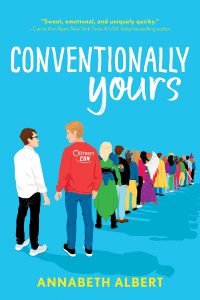
Since last Sunday was Valentine’s Day, I thought I’d select something romantic for this week’s Friday Reads. My choice: Conventionally Yours, by Annabeth Albert. If you’re a fan of the “enemies to lovers” and “forced proximity” romance tropes, this might be right down your alley. If you enjoy reading about gamer culture, even better!
Conventionally Yours falls neatly into the new adult romance subgenre. Conrad (21) and Alden (23), the two protagonists, are both navigating fraught transitions between college and uncertain adult futures—Conrad because he had to drop out of college after his parents cut off financial support when they found out he was gay; Alden, who’s neurodiverse, because of failed attempts to get into medical school, followed by pressure from his mothers to come up with immediately-actionable alternate plans.
Conrad and Alden’s initial interactions are at a local game shop, where both participate in a small group devoted to playing the popular card game, Odyssey. At this point, they don’t get along at all. Conrad views Alden as rigid, rules-bound, and no fun, whereas Alden sees Conrad as a popular but irresponsible college drop-out working a series of dead-end jobs. Then, due to a cascade of chance circumstances, and to their mutual horror, they wind up stuck together in a car on a cross-country road trip to “Massive Odyssey Con West,” where they’ll compete for a seat on the pro Odyssey tour—an outcome that both view as a miracle solution to their near-term problems.
While this might seem like a recipe for disaster, in true romance fashion the drive time provides opportunities for the two to get to know each other better, correct misconceptions, and develop feelings. Alden grows indignant on Conrad’s behalf when he learns his family disowned him, and when he realizes Conrad is skimping on food because of tenuous finances he begins “accidentally” ordering more than he can eat in order to share. Conrad, for his part, really listens when Alden lashes out at him after he makes caustic comments about Alden always trying to be perfect. For the first time, Alden feels like someone understands how imperfect he feels after his moms spent years trying to get him diagnosed and fixed. And for the first time, he feels acceptance: “You’re just you. Just Alden. It’s who you are. Changing any of it isn’t necessary,” Conrad assures him.
Though Conrad and Alden experience a détente, coupled with growing attraction and affection, during their time on the road, there is still plenty of drama and tension to be resolved, not least of which is competing against each other in the tournament after learning how much the other needs the win. However, as you can probably guess given this is genre romance, there are happy resolutions in store for Conrad and Alden, both individually and as a couple, in the end.
Albert, Annabeth. Conventionally Yours. Naperville, IL: Sourcebooks Casablanca, 2020.
Friday Reads: Eat the Buddha: Life and Death in a Tibetan Town, by Barbara Demick

Barbara Demick’s 2009 book, Nothing to Envy: Ordinary Lives in North Korea, blew me away with the eye-opening window it provided into everyday life in North Korea. In Eat the Buddha: Life and Death in a Tibetan Town, published this past July, Demick offers similar insight into Tibet by profiling a handful of individuals whose lived experiences paint a representative picture of life in a little-known land.
I’m guessing I’m not alone in my limited knowledge of Tibet. I associate it with the Dalai Lama, living in exile in India; Mount Everest, located on the border between Nepal and Tibet; and conflicts with the Chinese government, which claims sovereignty over it. After reading Demick’s book, I’ve definitely expanded my knowledge of the issues Tibetans have faced, particularly since 1950 when the Chinese army “liberated” them on behalf of Mao Zedong’s Communist Party.
Demick’s subjects tell tales of property seizure and struggle sessions. They also suffered from famine–a result of collectivization coordinated by cadres who ignored the delicate balance Tibetans had previously maintained between herding and high-altitude farming. Perhaps the biggest affront, however, was the Chinese government’s effort to suppress Tibetan’s religion, culture, and language through attacks on monks, monasteries, and the Dalai Lama:
Seeing the monks humiliated, statues smashed, and paintings burned shook Tibetans to the core. Buddhism provided the rituals through which the seasons were measured, births celebrated, and deaths grieved. . . . The attacks on religion alienated Tibetans who might otherwise have supported the Communist Party’s efforts to stamp out feudalism and create social equality. (48)
Not surprisingly, monasteries have become primary sites of contemporary Tibetan resistance. Initially demolished or repurposed in the late 1950s, monasteries started reopening in 1980. By 1994, however, the Communist Party had started cracking down on them again to “rein in Tibetan religious life” (144). Since then conflicts have escalated until, in 2009, a young monk set himself on fire, triggering a wave of self-immolations over subsequent years. (The 156th occurred on November 26, 2019.)
Due to the shocking nature of this means of political protest, self-immolations have received international media coverage. If you are like me, this may be the primary reason you have even the slightest inkling of what’s been happening in Tibet. If you’d like to learn more, however, you now have a book recommendation: Barbara Demick’s Eat the Buddha!
Demick, Barbara. Eat the Buddha: Life and Death in a Tibetan Town. New York: Random House, 2020.
Prenda Code Club Trial

EBSCO is offering Nebraska libraries a 30-day free trial of Prenda through the Nebraska Library Commission.
Description: Prenda is a fully self-paced coding product for librarians to use with students for clubs before school or after school. It currently offers 13+ coding languages for website development, gaming, back-end scripting, and curriculum for both robotics and maker devices. It has a robust administrative dashboard for user statistics which allows for things like password resets and unique messaging.
Prenda Code Club features include:
- Coding tutorials and activities to teach coding concepts
- Coding portfolio projects where coders build real websites, video games, apps, animations, and programs
- The coding languages, platforms, and devices included are Scratch, HTML, CSS, JavaScript, Python, Sphero, Ozobot, Rasberry Pi, and Makey Makey
- Unlimited users, unlimited access
- Gamified learning experience
- Robust and easy to use reporting
- Training and support to run virtual library code clubs.
To learn more about Prenda Code Club, visit their online product page or view the Prenda Code Club Software Demo
Trial Dates: The trial began on October 8, 2020 and will run for 30 days.
Trial access instructions: The trial URL, username, and password were distributed via an October 8, 2020 message to the TRIAL mailing list. Nebraska librarians who didn’t receive this information or would like to have it sent to them again can email Susan Knisely.
Note: If you are a Nebraska librarian and you’d like to receive future database trial announcements directly in your email inbox, please make sure you are signed up for the Nebraska Library Commission’s TRIAL mailing list.
Posted in Technology
Leave a comment
Computers in Libraries and Internet Librarian Connect 2020 Conference Discount
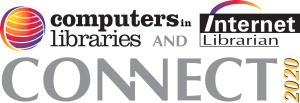
The 35th Computers in Libraries, scheduled to run from September 21, 2020 through September 25, 2020, is going VIRTUAL, along with Internet Librarian. Despite this change to an online venue, the Nebraska Library Commission, in cooperation with Information Today, is still able to offer a discount to Nebraska librarians who’d like to register to attend virtually.
For more information about the conference, including a schedule, session descriptions, and a list of speakers, view the conference website.
There will only be one pass type for this event: The All Access Virtual Pass. This pass includes access to all sessions, networking, and the virtual exhibit hall. It also includes access to archived session recordings for later viewing.
The discounted rate being offered to Nebraska librarians is $149 (regular $199). To receive this rate you must input our assigned discount code during registration.
Registration link: https://pheedloop.com/cilil2020/site/register/
Discount Code: NLCVirtual
If you have questions, please contact Susan Knisely.
Posted in Education & Training, Technology
Leave a comment
Friday Reads: Sigh, Gone: A Misfit’s Memoir of Great Books, Punk Rock, and the Fight to Fit In, by Phuc Tran
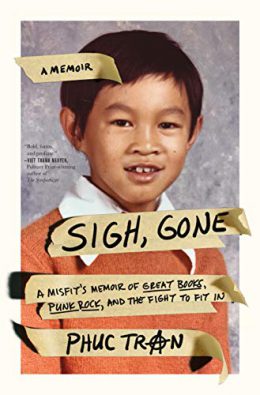
I love memoirs. Not only do they offer readers insight into what it’s like to live lives different from their own, they also remind us of how much we humans have in common. That’s definitely the case with Sigh, Gone: A Misfit’s Memoir of Great Books, Punk Rock, and the Fight to Fit In, by Vietnamese American teacher, writer, and tattoo artist Phuc Tran.
In 1975, when Tran was one, his family fled the fall of Saigon and wound up resettled in Carlisle, Pennsylvania. In Sigh Gone, Tran describes what it was like growing up as a member of “the token refugee family” (2) in town. As one can imagine, it included schoolyard taunts and name-calling, and, when out in public with his family, the discomfort of always sticking out.
Tran also describes the resentment he felt toward his parents over what he saw, at the time, as their cultural and English language failings: “I needed to trust in my dad’s ability to navigate the world at large, and I was already doubting him. . . . Five-year-olds were supposed to believe what their parents said. Maybe some kids’ parents still had the golden nimbus of infallibility, but not my parents and not for me” (16).
Going forward, Tran chronicles his relentless efforts to assimilate. By high school, his two-pronged strategy included pursuit of academic excellence and successful integration into the punk/skater subculture. Of the later, he writes, “[b]eing a freak because of my weird clothes and hair was a respite. These were things that I had chosen . . . Fighting rednecks because you were a punk was far better than fighting because you were Asian, and fighting with allies was far better than fighting alone” (6).
So why did this book resonate with me? For one, Tran’s depiction of high school, with its cliques and angst—a “cultural cul-de-sac built with the craftsman blueprint of John Hughes, the Frank Lloyd Wright of teen malaise” (2)—is viscerally familiar. His description of his job as a library page also warmed my librarian’s heart, as did his discovery and adoption of Clifton Fadiman’s The Lifetime Reading Plan, which he stumbled on while prepping for the library’s used book sale.
Though the Plan, was “unapologetically American, classist, and white” (4), Tran could not have cared less at the time; it served as a catalyst for his burgeoning love of literature–which the English major in me appreciated. He also viewed the Plan as his entrée to the world of big ideas that can connect people across time, geography, and culture—which is what Tran, himself, has accomplished with this memoir. Sigh, Gone concludes right after Tran graduates from high school, just as he’s poised to head off to Bard College, which had described itself to him in its admissions literature as “A Place to Think” (267). So fitting!
Friday Reads: Tightrope: Americans Reaching for Hope, by Nicholas D. Kristof and Sheryl WuDunn
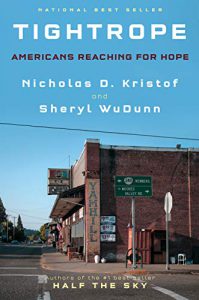
Tightrope, by married, Pulitzer Prize-winning journalists Nicholas Kristof and Sheryl WuDunn, is one of a number of recent books spotlighting the hopelessness and dysfunction that have decimated working-class America. In the 1970s, when Kristof was growing up in Yamhill, Oregon, working-class parents with good-paying union jobs had better lives than their parents did; everyone anticipated their children, with more education, would do better still. Sadly, that wasn’t the case. And, as the authors argue, this squandered potential hurts not just individuals who find themselves on a downward trajectory; it hurts the country as a whole.
Kristof and WuDunn document this reversal of fortune with extensive data, tracking declining median wages, life expectancy, educational achievement, and more. Citing the Social Progress Index, they point out that the United States now “rank[s] number 32 in internet access, number 39 in access to clean drinking water, number 50 in personal safety and number 61 in high-school enrollment…. Overall, the Social Progress Index ranks the United States number 25 in well-being of citizens, behind all the other members of the G7 as well as significantly poorer countries like Portugal and Slovenia” (13-14).
Kristof and WuDunn approach this topic not just through statistics, though. They humanize the crisis by sharing stories of friends and neighbors Kristof grew up with in Yamhill, Oregon, many of whose lives unraveled due to poverty, unemployment, substance abuse, incarceration, and despair. Here’s one stark metric they use to illustrate the extent of the problem: “About one-fourth of the kids who rode with Nick on the [school] bus are dead from drugs, suicide, alcohol, obesity, reckless accidents and other pathologies” (8).
Because Kristof grew up with many of his subjects and has had a lifelong relationship with them, he sees and portrays them as individuals possessing strengths and weaknesses. He acknowledges the bad choices they’ve made, but he’s also aware of their talents, their untapped potential, and the points at which their families, their schools, and punitive social policies let them down. Based on this insight, Kristoff and WuDunn contend that to address this crisis, we need to “transcend the customary narrative that focuses only on ‘personal responsibility’ and on glib talk about lifting oneself up by the bootstraps” (19). Additionally, we need to consider seriously what our collective responsibility is and should be.
Kristof, Nicholas D., and Sheryl WuDunn. Tightrope: Americans Reaching for Hope. New York. Alfred A. Knopf, 2020.
Value Line Library Database Trial (through 2/29/20)

Value Line is offering Nebraska libraries trial access to their online investment research service during the month of February.
Description: Value Line Library Research Center is a single, cost-effective research package covering multiple asset classes, combining the built-in speed, convenience, accuracy, and functionality that can transform an average investor into an extremely profitable one. Contains research on stocks, mutual funds, ETFs, Options, and a special investment portfolio model. Read more about Value Line Library Research Center online, or view a video.
Trial access instructions (URL, username, password) were distributed via a January 31, 2020 message to the TRIAL mailing list. Nebraska librarians who didn’t receive this information or would like to have it sent to them again may contact Susan Knisely.
Note: Not all trial announcements are posted to this blog. If you are a Nebraska librarian and you’d like to receive future database trial announcements directly in your inbox, please make sure you are signed up for the Nebraska Library Commission’s Trial mailing list.
Posted in Information Resources, Technology
Leave a comment
Friday Reads: Exile from Eden, by Andrew Smith

Exile from Eden, the featured title in this Friday Reads, is the sequel to Andrew Smith’s 2014 apocalyptic novel, Grasshopper Jungle, which I claimed as my new favorite book in a July 15, 2016 Friday Reads. I guess, therefore, this is a sequel Friday Reads.
Exile from Eden begins sixteen years after six-foot-tall praying mantises with a taste for human flesh forced Austin Szczerba, Robby Brees, and Shann Collins, along with Robby’s mother, Connie Brees, her boyfriend, Louis Sing, Shann’s mother and stepfather, Wendy and Johnny McKeon, and Austin’s dog, Ingrid, to hole up in an underground bunker, called Eden. During these sixteen years, Johnny McKeon and Ingrid have died, and Arek Szczerba and Mel Sing have been born. Arek is the son of Austin and Shann, though he considers Robby his second father. Mel is the daughter of Connie and Louis.
Narrated by sixteen-year-old Arek, Exile from Eden tells the story of what happens when he and fifteen-year-old Mel leave Eden (or, as Arek calls it, “the hole”) to search for Austin and Robby, who have failed to return from one of their regular supply-gathering missions. A road trip adventure ensues. As was the case with Grasshopper Jungle, however, Exile from Eden is about so much more than a mere plot summary would suggest. After all, as Austin stated in Grasshopper Jungle, “[g]ood books are about everything.”
In Grasshopper Jungle, Austin was obsessed with recording history and telling the truth. In Exile from Eden, Arek, his son, also ruminates on truth—how we construct it for ourselves and try to convey it to others: “All stories are true the moment they are told,” Arek states in the opening sentence of the book. “Whether or not they continue to be true is up to the listener” (3).
Because he was born and raised in the hole, Arek has no firsthand knowledge of the before-the-hole world, and extremely limited exposure to the new post-apocalyptic world outside the hole. To address this deficit, his father, Austin, brings back artifacts—including books, maps, and paintings—to try to build a model of the world for Arek. As Arek discovers after leaving the hole, however, “the model . . . is not the thing” (110). This leads him to further epistemological exploration of what we can know and how we can know it:
. . . My father’s model of the world was supposed to represent everything that was outside the hole. The only thing that can re-present anything real is the thing itself. No models can ever adequately perform that job.
The model presents—and re-presents—only the model, and nothing more.
And the data—what’s really outside the hole—does not call to us, so we must go to it, and then interpret its meaning with our incompetent human minds. The data is mute; we give it an imperfect voice. (110)
Exile from Eden juxtaposes the before-the-hole world, with its rules and protocols, shame and inhibitions, with the terrifying, unstructured freedom offered by the after-the-hole world. In Eden, Arek’s grandmother, Wendy–“SPEAKER OF LAWS” (20), believer in following instructions, and segregator of the sexes—represents the pre-hole world. The promise of the post-hole world, on the other hand, is captured most powerfully by a line from Herman Melville’s Moby-Dick, recited by Arek’s father, Austin, after he and Arek finish reading the book aloud to each other: “In landlessness alone resides the highest truth, shoreless, indefinite as God” (244).
At one point, Austin tells Arek “you and Mel are like the first humans on earth. You are the new people, without the baggage everyone carried with them, without end, from before” (188). Indeed, after months outside the hole, Arek describes Mel and himself as “joined to the world outside, not as pieces of a model, but as the thing itself” (347).
In the final chapter, when he and Mel finally reunite with Austin and Robby, Arek, channeling Melville, describes himself as “Shoreless Man.” And when Austin asks how he likes it outside the hole, Arek replies “There are no rules, and it’s wild” (353). Based on the premise set up throughout the book, this is a good thing and a happy ending.
Smith, Andrew. Exile from Eden. New York: Simon & Schuster Children’s Publishing, 2019.
Computers in Libraries 2020 Conference (March 31 – April 2)

The Nebraska Library Commission is offering a group discount to all Nebraska librarians who attend the Computers in Libraries 2020 conference. This year it will be held at the Hyatt Regency Crystal City, Arlington, VA, on March 31st through April 2nd, 2020. Detailed information about the conference can be found on the conference web page.
This year the Gold Pass will be available for the group rate of $629 (regular rate is $819). The Full 3-day Pass will be $359 (regular rate is $519). (No discount rates are available for the preconference workshops, unless purchased as part of a Gold Pass.)
In addition, discount prices of $599 (regular $719) on the Library Leaders Summit (includes all three days of CIL), and $149 (regularly $219) on the Internet@Schools Track are also available.
To receive the discount:
- Go to the Computers in Libraries 2020 Registration page:
http://computersinlibraries.infotoday.com/2020/Registration.aspx - Click on the Register Now graphic at the top of the page.
- Type priority code NLC20 in the Priority Code field at the top of the form, and click the “Activate Code” button. Discounted rates should appear on the registration form after you successfully activate the code. If you don’t see the discounted rates on the form, please contact Susan Knisely for assistance.
- Complete and submit the online form by the February 28th deadline.
Deadline: Online registrations can be made until February 28th to receive the discounted rates. After this time, rates will go up by $20.
Posted in Education & Training, Technology
Leave a comment
Friday Reads: Say Nothing: A True Story of Murder and Memory in Northern Ireland, by Patrick Radden Keefe
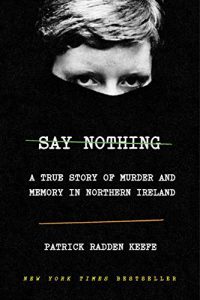
Growing up in the ’70s and ’80s, I was aware of sectarian violence in Northern Ireland—I heard news reports of IRA bombings and hunger strikes—but I definitely didn’t have a clear understanding of the issues. Therefore, when Patrick Keefe published Say Nothing: A True Story of Murder and Memory in Northern Ireland to rave reviews earlier this year, I figured it would be an educational and engaging read. I wasn’t disappointed.
As its subtitle suggests, Say Nothing follows some conventions of the true crime genre. The book begins with the 1972 abduction of Jean McConville, a mother of 10, from her apartment in a public housing complex in West Belfast. Twenty-some chapters later, in 2003, her remains are uncovered on a beach in the Republic of Ireland, just south of the border with Northern Ireland. A pathologist’s report suggests she died from a single gunshot to the back of the head.
The “whodunit” thread definitely runs throughout the narrative, sometimes surfacing as a major plot point, but just as often fading into the background. My sense is that Keefe’s primary interest is in using McConville’s disappearance as a springboard for his broader exploration of the period known as the Troubles—three decades of violence centered in Northern Ireland, beginning in the late 1960s and running through approximately 1998.
My takeaways from reading the book include a more granular understanding of the differences between the Official IRA, the Provisional IRA, and Siin Féin; greater awareness of the various roles played by Gerry Adams during the Troubles, as well as insight into why he is such a controversial figure; and the sobering realization that Bobby Sands was actually one of ten hunger strikers who died at intervals over the summer of 1981.
Say Nothing is exactly the kind of nonfiction book I enjoy. It taught me something new without giving off a dry textbook vibe. It’s also given me a more nuanced understanding of how tensions from the past inform present day concerns—in this instance, related to Brexit. Chief among these concerns is what impact the United Kingdom’s exit from the European Union will have on the border between Northern Ireland and the Republic of Ireland.
Speculation also swirls that Brexit may tip the scale toward Irish unification—a longstanding republican dream. As Keefe writes, “[i]t would be ironic, to say the least, if one inadvertent long-term consequence of the Brexit referendum was a united Ireland—an outcome that three decades of appalling bloodshed and some thirty-five hundred lost lives had failed to achieve.”
Overall, this book is a powerful reminder of William Faulkner’s assertion that “[t]he past is never dead. It isn’t even past.”
Keefe, Patrick Radden. Say Nothing: A True Story of Murder and Memory in Northern Ireland. New York: Doubleday, 2019.
EBSCO Database Trial
 EBSCO is offering Nebraska libraries trial access to three databases beginning August 1 and running through October 27, 2019.
EBSCO is offering Nebraska libraries trial access to three databases beginning August 1 and running through October 27, 2019.
Databases available for trial include:
- Hobbies & Crafts Reference Center
- Home Improvement Reference Center
- Small Engine Repair Reference Center
Trial access instructions (URL, username, password) were distributed via an August 1, 2019 message to the Trial mailing list. Nebraska librarians who didn’t receive this information, or who would like to have it sent to them again, may contact Susan Knisely.
To request a price quote, contact Susan Knisely at the Nebraska Library Commission. Please indicate which of the three databases you are interested in.
*** Note: Not all trial announcements are posted to this blog. If you are a Nebraska librarian and you’d like to receive future database trial announcements directly in your inbox, please make sure you are signed up for the Nebraska Library Commission’s Trial mailing list.
Posted in Information Resources, Technology
Leave a comment


